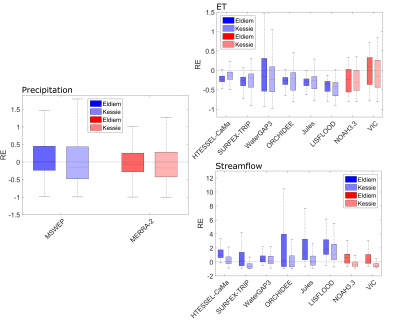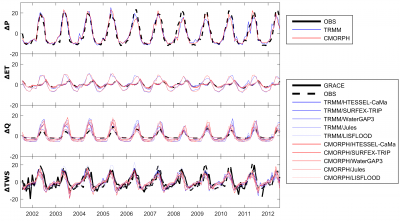Background
Upper Blue Nile basin’s hydrology plays a significant international role, being the headwaters of the Blue Nile Basin, where it contributes about 60% of the total annual flow of the Nile. Improved understanding and managing water resources in a sustainable manner requires at the very least an adequate characterization of hydrological fluxes (precipitation, streamflow and evapotranspiration) and states (soil moisture) at monthly and annual scale. Water resources reanalysis (WRR) products provide a unique opportunity to advance understanding of hydrologic processes at regions where in situ information is sparse or nonexistent. However, these products are also associated with uncertainty related to the various uncertainty sources in the forcing dataset and modeling schemes involved. Understanding and evaluating uncertainty is therefore imperative for advancing application of these products in water resources.
Objective
In this study we present a comprehensive evaluation and intercomparison of water cycle components derived from state-of-the-art water resources reanalysis (WRR) products associated with different LSMs, meteorological forcing and precipitation datasets in the Upper Blue Nile basin in Ethiopia. The objective is to evaluate uncertainty and identify the most suitable combination of Land Surface Model (LSM) and precipitation forcing to represent the dynamics of water cycle components in the Upper Blue Nile basin.
Initial Results
Results from this analysis highlight the current strengths and limitations of available WRR datasets in analyzing the hydrological cycle and dynamics of East Africa. This analysis shows that the WRR products which provided better representation of the streamflow, exhibited the poorest performance in ET representation. The results presented in this study would recommend that the representation of the water cycle components from different reanalysis products is affected mainly by the differences in the schemes that the various LSMs use and not by variations of precipitation forcing.
Dissemination
Marika Koukoula, Efthymios I. Nikolopoulos, Zoi Dokou, Emmanouil N. Anagnostou, 2017: Uncertainty in the estimation of water budget from reanalysis products: Evaluation in Upper Blue Nile river basin, European Geosciences Union (EGU) General Assembly 2018, 8–13 April 2018, Vienna, Austria.
Research Team
Marika Koukoula, Graduate Student, Civil and Environmental Engineering, University of Connecticut.
Efthymios I. Nikolopoulos, Assistant Research Professor of Civil and Environmental Engineering, University of Connecticut.
Zoi Dokou, Assistant Research Professor of Civil and Environmental Engineering, University of Connecticut.
Emmanouil N. Anagnostou, Professor of Civil and Environmental Engineering, University of Connecticut.

Figure 1. Relative errors at monthly scale

Figure 2. Statistical evaluation at monthly scale

Figure 3. Water budget analysis